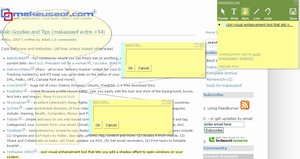 For a person who does lots of absorbing and creating on the internet, a big new thing can feel incredibly daunting. The specter of Being Behind always lurks as a possibility in the nightmare of waking up to discover that the internet has moved on and left you behind like an old Web 1.0 site. The changing internet means changing habits, ways of working, and language. Being in the present takes constant effort, a constant willingness to uproot and retool, to learn to absorb even more needless—but suddenly necessary—information. Fall behind and, well, you’ll know it. You’ll be like your parents.
For a person who does lots of absorbing and creating on the internet, a big new thing can feel incredibly daunting. The specter of Being Behind always lurks as a possibility in the nightmare of waking up to discover that the internet has moved on and left you behind like an old Web 1.0 site. The changing internet means changing habits, ways of working, and language. Being in the present takes constant effort, a constant willingness to uproot and retool, to learn to absorb even more needless—but suddenly necessary—information. Fall behind and, well, you’ll know it. You’ll be like your parents.
This is the kind of feeling that hit me last week when I began to explore the burgeoning world of web annotation.
Don’t worry, it hasn’t hit the big-time yet, and perhaps it never will. But just the possibility is overwhelming enough to make one want to move to the desert. It also has the potential to make the internet a whole lot more interesting.
I am drawn to the internet—to keeping this blog, for instance—because of its capacity for conversation. I love conversation and will go to great lengths to get it. But you’ve got to admit, the possibilities for conversation on a blog are pretty limited. For the most part, it is the kind of conversation only the blogger can enjoy. The big main post sits on its throne at the top of the page while the little mere comments (usually in a smaller typeface) twiddle their thumbs at the bottom, hoping someone will look at them before posting yet another bit of inflammatory nonsense. It isn’t conversation, it’s a peanut gallery.
Web annotation changes the picture. Basically a ramped-up combination of a highlighting pen and social bookmarking, it enables users to write notes on webpages they visit and share what they write with friends and strangers. Web annotation tools usually take the form of browser plug-ins, as well as a profile page (i.e. Facebook or del.icio.us), where you can manage and share your annotations.
One the one hand, it is a neat personal tool to help you remember things that came to mind while reading. There is no substitute for a library full of books with your own scribbles in them, so why not have a scribbled up web too? On the other, though, the social networking aspect means that web annotation can change the way we approach the perennial problem of finding and organizing all the data that’s out there. In the process, though, an annotated web means a dizzingly wider worldly web.
The direction annotation takes the web—when carried to extremes, as everything on the internet is—leads to a phase shift. The current regime of Web 2.0 distinguishes between user-generated and “regular” content. A Web 3.0 based in annotation would blur this distinction. Cleverly organized, the miracle of Wikipedia could be replicated everywhere: an endless barrage of annotations, organized into something incredibly useful at a very small cost. It is the wet-dream of postmodern theorists: the annotations become the content.
(Meanwhile, things go in a rather opposite direction of one of the other proposals for Web 3.0, the semantic web. Rather than becoming more structured for machine comprehension, as the semantic web would have it, the web becomes less structured and even more webby. Machine comprehension, which will always be a holy grail, would have to be accomplished by making computers better at processing human language—which would be available in abundance on an annotated web.)
It is another thing to make your head spin.
Comments
4 responses to “All the Web a Wiki”
Semantic web is neo-Kantian. Annotated post-modern. No new ideas.
Well, yes and no. I’m not sure how far it carries us to label these technologies with philosophical resemblances. You can say the idea of the atom bomb was just rehashed apocalyptic alchemy, but that doesn’t change the fact that its actual invention, its actual existence has a dramatic and dramatically new impact on our being in the world.
Every invention comes with unanticipated, unanticipatable consequences. The engineers can never quite predict what the mass of people will do with a thing.
If semantic web happens, we will not be thinking, “Oh, this is such a rehash of Kant. Bor-ing!” We’ll be worrying about what the consequences of machine-readable information will be, and how it will affect how we operate. It could get really weird, in ways we don’t even have names for. Then, I think, we’ll be in a position to begin labeling.
I agree with everything except the statement ‘we will not be thinking.’ I at least will be thinking in such a way.
Fair enough. For that matter, I probably will be right there with you! Lots of other folks will consider us quite irrelevant though.